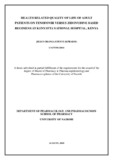| dc.contributor.author | Etenyi, Jilian Oranga | |
| dc.date.accessioned | 2018-10-25T12:34:24Z | |
| dc.date.available | 2018-10-25T12:34:24Z | |
| dc.date.issued | 2018 | |
| dc.identifier.citation | Master of Pharmacy in Pharmacoepidemiology and Pharmacovigilance | en_US |
| dc.identifier.uri | http://hdl.handle.net/11295/104451 | |
| dc.description | Master of Pharmacy in Pharmacoepidemiology and Pharmacovigilance | en_US |
| dc.description.abstract | Background: Quality of life improvement is one of the objectives of antiretroviral therapy. It
is vital to assess the perception of the patient on their functional status and well-being termed
as Health Related Quality of Life (HRQoL). HRQoL is a vital outcome measure in HIV
management considering its long survival prospect. Zidovudine and tenofovir are widely used
as first line antiretroviral in HIV management. The side effects of antiretroviral may affect
one’s quality of life.
Objective: The study aimed to compare the Health Related Quality of Life of adult patients
on tenofovir versus zidovudine based regimens at Kenyatta National Hospital.
Methods: A hospital based comparative cross sectional study was conducted on 501
participants. The participants were conveniently selected and recruited from HIV infected
patients attending the Comprehensive Care Centre clinic at Kenyatta National Hospital in
2015-2016. The Medical Outcome Study HIV Health Survey (MOS) questionnaire was used
to elicit information on the patient’s quality of life. The data obtained were scored and
summarized on a scale of 0-100. Two broad aspects of health, Physical Health Summary
(PHS) and Mental Health Summary (MHS) were generated. Linear regression analysis was
performed to identify the key determinants of HRQoL.
Results: Patients on zidovudine had a better HRQoL than those on tenofovir. The proportion
of participants on tenofovir was 60.8 %. The most important determinants of PHS were:
presence of any symptom of disease (β -5.58, 95 % CI; -8.07,-3.09), regular source of income
(β 2.62, 95 % CI; 0.46, 4.78) and stated inability to cope (β -1.81, 95 % CI; -2.56,-1.10).
The key determinants of the MHS were the ART regimen, presence of any symptom of
illness (β -1.24, 95 % CI; -2.253, -0.226), absence of pain (β 0.413, 95 % CI; 0.152, 0.674)
and patient stated inability to cope with HIV (β -1.029, 95 % CI; -1.441,-0.617). Presence of
any symptom had a negative association with MHS with participants on tenofovir having a
higher prevalence of symptoms of illness/side effects. Being on tenofovir based regimens and
second line regimens were the risk factors for the presence of side effects/symptoms of
illness.
Conclusion and recommendation: Participants on zidovudine based regimens demonstrated
better performance across all the aspects assessed and thus had a better HRQoL. There is
need for occasional quality of life studies to ascertain the impact of treatment as perceived by
the patients. | en_US |
| dc.language.iso | en | en_US |
| dc.publisher | University of Nairobi | en_US |
| dc.rights | Attribution-NonCommercial-NoDerivs 3.0 United States | * |
| dc.rights.uri | http://creativecommons.org/licenses/by-nc-nd/3.0/us/ | * |
| dc.subject | Adult patients | en_US |
| dc.subject | Tenofovir | en_US |
| dc.subject | Zidovudine | en_US |
| dc.title | Health related quality of life of adult patients on tenofovir versus zidovudine based regimens at Kenyatta National Hospital, Kenya | en_US |
| dc.type | Thesis | en_US |
| dc.description.department | a
Department of Psychiatry, University of Nairobi, ; bDepartment of Mental Health, School of Medicine,
Moi University, Eldoret, Kenya | |



